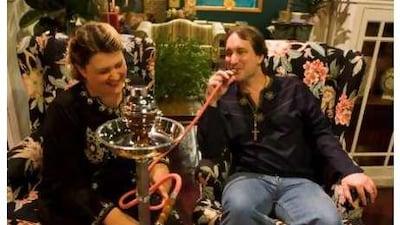NEW YORK // When Kevin Wierman opened a cafe in Hendersonville, his conservative hometown in North Carolina, some local people were concerned that it might degenerate into a hippie den. But Mr Wierman had a quite different vision for the establishment: to share with townspeople the penchant for smoking shisha he acquired when based in Fujairah during his US naval career. The Hookah House has introduced growing numbers of Hendersonville's population of 10,000 to elements of Arabian social life far removed from the ambience of typical American bars, where conversation is all but stifled by loud music and televisions.
"If you're looking for entertainment in a small town like this, you have basically got two choices," said Mr Wierman. "You can sit around and play video games, or you can go to a pub. "Guys who go to these pubs throw a few darts and get drunk, but they never really get to know the people they are hanging out with." For this reason, Mr Wierman and his wife, Allison, both 44, opened their cafe in April 2007 with some strict ground rules: no television, no alcohol and no drugs. They even insist on customers sharing pipes rather than retreating into a corner to puff on their own.
"When people come to the Hookah House, I tell them that they're not going to get high because we don't serve alcohol or tolerate drugs," said Mr Wierman, the father of three children. "But if they want to have fun, play games, socialise and challenge their minds, then they're welcome." The couple believe they have found a winning formula in a town with little to offer by way of entertainment. They have already expanded into bigger premises and now attract backgammon devotees and a book reading circle as well as shisha smokers. Young women particularly enjoy meeting in a place where men "don't hit on them", and four couples are said to have fallen in love over their shared hookahs.
"They attribute this to the fact that they got to know each other as soul mates while smoking shisha at the Hookah House," Mr Wierman said. Dustin Lee, 23, a folk guitarist, has made the cafe a regular haunt, working his way through most of the menu of 50 shisha flavours and discovering a preference for a distinctively American aroma, cactus pear. "Before this place opened, there was nothing apart from a few clubs and bars," he said. "The Hookah House is just really laid back. You don't have to worry about anybody spilling a drink on you."
Rimas Zailskas, 52, a regional magazine publisher, said some members of Hendersonville's typically mature community raised their eyebrows at the prospect of a shisha joint on their doorstep, fearing it would become a centre for drug dealing and iniquity. "When I first heard about it, I wasn't sure how well-received it would be," he admitted. "But, now, people seem to like it a lot. It's a very nice thing to have in town. I'm sure in the Middle East smoking a hookah is an ordinary thing to do, but here in Hendersonville, it's a little unusual and exotic."
Mr Wierman grew fond of hookah while serving as a navy petty officer in Fujairah in 2006, helping to protect the commercial and military ships of the United States and its allies from any belligerent vessels and potential terrorist strikes. He broke military rules banning socialising with locals, however, by sneaking from his navy apartment to a crammed ghetto inhabited by Chinese, Filipino and South Asian workers. "At night, they used to take furniture out of the shops, put a table out on the sidewalk, and we would play chess, backgammon and dominoes," he recalled. "We would play for hours, from 10pm until four in the morning, smoking shisha, talking and laughing.
"Sometimes there would literally be 10 people, with six languages spoken, four religions covered, and it didn't matter. We all wanted the same things out of life: to be safe, healthy, happy and have a good future for our children. I learned a lot there about humanity and people." Some parts of the US enforce strict rules against smoking in public venues on health grounds. But North Carolina is a tobacco state; it ranked first in tobacco production in the nation and had an annual farm income of US$587 million (Dh2.2 billion) last year, and smoking is allowed in a number of public places. Things are different 12,000km away in the Emirates, where recently introduced rules - including prohibitions on the outdoor smoking of shisha, blanket bans in some areas and minimum size requirements for cafes - are taking a toll on businesses. Aware of how the UAE's new shisha rules are affecting cafe owners, Mr Wierman is appealing to officials not to clamp down too hard on a much-loved Arabian tradition. "I think it would be a great loss to their culture and their history," he said. "Prohibiting shisha would be a tragic loss. It would close doors to relationships, and, in particular, international relationships between locals and foreigners, for socialising and friendship." @email:jreinl@thenational.a


